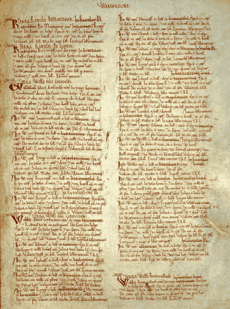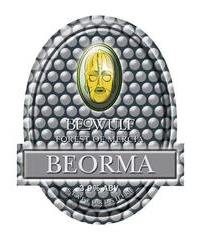Beorma facts for kids
Beorma (pronounced BAY-or-mə) is the name often given to an Anglo-Saxon leader from around the 7th century. He is thought to be the founder or an early leader of the settlement that later became the city of Birmingham in England. The area was known as "Beorma's ham" (meaning "Beorma's homestead") or "Beorma-inga-ham" (meaning "homestead of Beorma's people or tribe"). This was before Birmingham was first officially mentioned in a record called the Domesday Book in 1086.
Most historians believe Beorma was a real person. Another Anglo-Saxon with a similar name owned a farmstead called Barton-on-Sea in Hampshire. This place also appeared in the Domesday Book with names like Bermintune and Burmintune, which are very similar to Birmingham. The word 'beorn' means 'prince' in Old English, and the ending '-ing' often means 'people of'. This supports the idea that Beorma was a human leader. However, some think the name might come from the plant 'broom', which grew in forest clearings.
Contents
Who Was Beorma?

If Beorma was the person Birmingham was named after, there are a few ideas about who he might have been:
- He could have been the founder or an ancestor of a tribe called the beormingas. This tribe might have lived in the area that became Anglo-Saxon Mercia a long time ago.
- He might have been the leader of a tribe or family group who traveled together to settle in Mercia.
- He could have been the leader of a group, perhaps even soldiers, who had an agreement with one of the Mercian kings.
What Does the Name "Beorma" Mean?
In Old English, the word Beorma can mean "fermented," "head of beer," "yeasty," or "frothy." This is where modern English words like "barm" (the foam on fermenting beer) and "barmy" (meaning crazy) come from.
The idea that Beorma founded Birmingham became popular after World War II. In 1940, a scholar named Eilert Ekwall suggested that "Birmingham probably meant 'the Hamm of Beornmund’s people' (Old English Beornmund-ingaham). Or the direct base may be a pet-form Beorma from Beornmund."
Another scholar, J.M. Dodgson, added to this idea. He suggested that settlements ending in –ingaham, like Birmingham and Nottingham, were older than places ending in –ing, like Reading and Hastings. This made the idea that Birmingham was once the territory of the Beormingas tribe even stronger. Interestingly, J.R.R. Tolkien used a character named Beorn in his book The Hobbit, possibly inspired by these links to the Birmingham area.
Other Names for Birmingham's Founder
We don't have any records of Birmingham's name from the Anglo-Saxon period itself. The first mention is Bermingham in the Domesday Book of 1086. Because of this, Beorma is the most common name linked to the city's founder. However, Birmingham's name has been spelled in many different ways over time. This has led to other possible names for its founder, such as Bearm, Berm, Beor, Bearma, Beorm, and Breme.
These names might also be connected to other Anglo-Saxon place names found near Birmingham, like Barton, Bearwood, Berwood, Bordesley, Brewood, and Burcot. The large number of similar names in the area suggests that Beorma's tribe, the beormingas, might have settled across the wider woodland area that was the northern part of the Forest of Arden.
Breme or Brom
Another common name linked to Birmingham's origin is Breme or Brom. This could be a person's name, but it's also thought to come from the spiky plant called 'broom'. This plant was very common in the clearings of the Forest of Arden.
Birmingham has also been known as Bromwycham. Nearby towns with similar names include Bromford, Little Bromwich, West Bromwich, Bromsgrove, Broomhill and several Bromleys in Staffordshire and Warwickshire. By the 14th century, there were so many English place names starting with Brom- that people had to add extra words to tell them apart, like Abbots Bromley and Kings Bromley.
Beorma and the Mercian Kings
If Beorma is a shorter version of Beornmund (where Beorn means 'prince' and Mund means 'hand'), then the name could mean "Princely protector" or "the Prince's hand." This suggests Beorma might have been a royal name or the name of a king's important follower (a 'thegn').
This royal connection for the founder of an early tribe near the founders of Mercia is interesting. It highlights the similarity between Beornmund or Beorma and the names of some Mercian kings. Historian Dr. Barbara Yorke noted a "B-line" of Mercian kings, including Beornred, Beornwulf, Beorhtwulf and Burgred.
Beorma in Modern Times
The name Beorma has been used many times to connect with and promote the city of Birmingham. It has grown from an academic idea about where the name came from into a well-known, though mythical, character. This character now represents Birmingham's Anglo-Saxon beginnings.
Arch of the Beorma Tribe
In 2002, Birmingham's medieval history was celebrated with special steel arches. These arches were placed in Gooch Street on a bridge over the River Rea in the Highgate area. An artist named Steve Field created them. The memorial says, "near this river crossing an Anglian tribe led by Beorma founded Birmingham."
Beowulf Brewery
A small brewery called Beowulf Brewing Company started in Birmingham's Yardley area in 1996. They created a series of beers with Anglo-Saxon names, many linked to the legend of Beowulf. One of their beers, a light bitter, was named Beorma. This was to celebrate the city where the brewery began.
Beorma Quarter
The "Beorma Quarter" is a large building project planned for Birmingham. It started in 2010 and is a multi-million-pound development. It's like a "city-within-a-city" with a 30-story building. It's located at the end of Digbeth High Street, across from Birmingham's Selfridges building. The project aims to include a Marriott Hotel, apartments, green spaces, shops, and a public area. It will also reuse two old cold storage buildings for creative businesses.
Artistic Works Inspired by Beorma
- Toccata Beorma: In 1972, after receiving an honorary degree from the University of Birmingham, the famous organist George Thalben-Ball wrote a piece of music called 'Toccata Beorma'. It was a celebration of his connection to the city.
- Tribe of Beorma: In 2000, the Women & Theatre company went on a national tour. They performed a new musical play called Tribe of Beorma, written by Janice Connolly.
- What is Missing from your Life? The Men: On March 5, 2007, a radio play by Stephanie Dale was broadcast on Radio 4. It told a fictional story about Beorma, mixed with true stories of men who lived and worked in Birmingham.
 | Sharif Bey |
 | Hale Woodruff |
 | Richmond Barthé |
 | Purvis Young |


